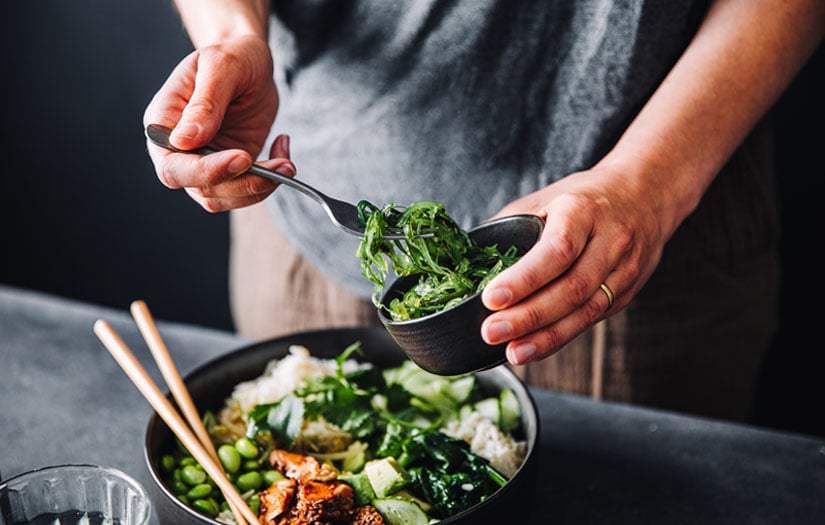“You must eat to survive!”
There is truth to this statement because no amount of caffeine or B12 shots will sustain you without a proper diet. Food is fuel… and today you are going to learn how eating influences your energy levels, and the proper way to manipulate food intake to boost your levels if you ever feel low.
What is the link between eating and energy? Taking it back to metabolism and biochemistry 101… food or nutrients is categorized into two groups: macronutrients and micronutrients. Let’s take a look at how we can get the best energy resources from what we eat.
Macro vs. Micro
Macronutrients are foods needed in large quantities in the diet daily to provide the body with energy. The three main macronutrients are carbohydrates, proteins, and fats.
Micronutrients are going to be vitamins and minerals and are referred to as "micro" because they are needed in smaller quantities every day. However, micronutrients DO NOT provide the body with energy. Instead, they are involved in various metabolic processes, including energy pathways. Therefore, micronutrient deficiencies can depress the energy systems needed to help you feel better.
Circling back to macronutrients — carbohydrates and fats are going to be the main types of foods that directly influence energy systems. Proteins such as chicken, eggs, fish, and beef are mainly used to restore and rebuild muscle tissues, preserve the immune system, act as chemical messengers, and much more. Carbohydrates such as grains, cereals, fruits, vegetables, and legumes are going to be the body's preferred fuel source for energy.
Carbohydrates can be broken down the fastest out of all macronutrients, and all cells in the body thrive off of them as an energy source. Fats such as avocado, oils, and nuts also provide energy, however, they take much longer to digest. Therefore, fats are great if you're looking to have long, sustained energy levels.
Breaking Down the Basics
So, after reviewing the basics, what is the link between eating and energy? As just mentioned, carbs provide "quick" energy and fats provide "slow" energy… but many people experience "sluggishness" or "energy dips" throughout the day and that is largely influenced by your blood sugar levels. If blood sugar levels drop too low, or spike and then fall quickly it can create feelings of fatigue.
How can one "hack the system" to avoid energy dips and major feelings of fatigue over the day? Is there a special food formula? Why yes, there is!
First, when the energy in the form of carbohydrates is consumed, a hormone called insulin is secreted to allow that "energy" to enter cells so it can be used to power the whole body. When carbohydrates are consumed without the presence of other foods or are simple carbohydrates in the form of sugar or refined products, it can spike your blood sugars very high causing a strong release of insulin. That insulin allows for quick absorption of those sugars to give you a strong and quick boost of energy, however, it can be very fleeting and result in a "crash" not too long after.
How to Get the Most Energy Out of What You Eat
So, what are the best foods to provide you with energy?
Complex Carbohydrates
Complex carbohydrates are carbohydrates that contain fiber and take longer to digest. Examples include legumes, whole grains, fruits, and vegetables. Consuming complex carbohydrates helps prevent large spikes in blood sugars and insulin to allow a more sustained release of energy throughout the day. Try adding sweet potato or quinoa in place of white rice in your next meal and test how you feel!
Iron Rich Foods
While iron does not directly provide "energy" it is an essential component of hemoglobin, the oxygen-carrying red blood cell. Iron deficiency can often be a link to low energy since it is imperative for energy metabolism and oxygen transport. Three top iron-rich foods include fortified breakfast cereals, oysters, and white beans! Beef is also an excellent source of iron.
Foods High in B-Vitamins
B-vitamins all play essential roles in various metabolic processes — especially the optimal function of energy pathways. B12 is commonly known as the "energy" vitamin because B12 is needed to form red blood cells.
Therefore, deficiencies can lead to feelings of fatigue since red blood cells are responsible for transferring nutrients and oxygen throughout the body. B-vitamins are mainly found in whole grains, legumes, fruits, and vegetables and rich sources of B-12 include animal meats such as eggs, fish, chicken, and beef.
Healthy Fats
Healthy fats such as olive oils, nuts, seeds, and avocados are rich in various vitamins and minerals and play important roles in decreasing inflammation within the body. Fats are also very filling, meaning they can supply you with energy for hours (without an associated crash)!
How to Hack Energy
Using the above information, what is the "hack" on nutrition to optimize your energy throughout the day?
First, consistency is key. Consuming a meal or snack roughly every 3-4 hours has been shown to provide the most benefit in stabilizing energy levels throughout the day and preventing excessive snacking. Secondly, it is important to be selective about meal composition. When "building your plate" it is important to include various food groups so the absorption of nutrients is slowed, allowing for a slow release of energy into your body.
This helps to avoid blood sugar spikes and crashes. Always including fibrous fruits or vegetables, complex carbohydrates, or fats along with protein is going to be the best combination for sustained energy and satiation. Going the snack route? Try opting for complex carbohydrates, such as a banana or apple. Also pairing a complex carbohydrate with a healthy fat will again allow for sustained energy throughout the day. An example would be an apple with peanut butter!
Are There Any Foods That Should Be Avoided?
Some foods that may give you an initial boost of energy, but result in those big crashes later can include things like:
• Sugar/candies/refined carbohydrates
• Energy Drinks
• Sodas
Refined carbohydrates or simple carbohydrates are broken down and digested in as little as 15 minutes. When consumed alone, they cause very quick rises in blood sugar. However, as mentioned earlier can also lead to quick falls since the absorption is so quick.
Energy drinks might seem like a great alternative for a quick energy boost; however, the caffeine content can have major effects on your nervous system later in the day. The half-life of caffeine is 4-6 hours. Depending on when you consume caffeine, it can affect your sleep which can deplete your energy levels the next day. Additionally, many energy drinks are filled with extra sugars that can again cause quick spikes in blood sugar but result in a quick fall too.
Soda is an additional version of simple sugars without any additional nutrients to support healthy bodily function. Does more need to be said?
Summary
It should be noted that energy levels can largely be affected by factors other than food. Quality sleep, hydration, and exercise are also important influences along with a healthy, balanced diet. However, in regard to boosting energy, choosing whole foods rich in vitamins and minerals is going to have the best effect on long, sustained energy levels over the day.
Consuming regular meals and balancing meal/snack selection with complex carbohydrates, healthy fats, and protein is going to give you the best bang for your buck.

















